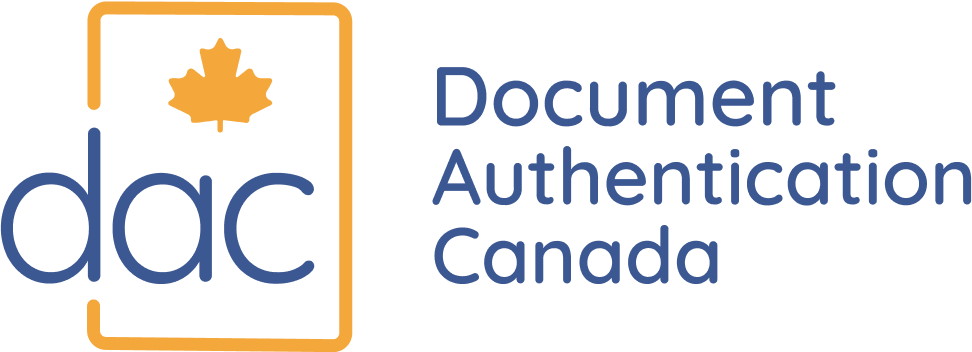Police Record Check Authentication & Legalization
- Fast authentication service → 1-3 days
- Easy to follow process with up to date step-by-step document tracking
- Great prices starting at just $90




Free Expert Document Review
Police Certificate Authentication in Canada
If you’re starting a new job or immigrating to a new country, chances are that you’ll be asked to present a criminal record check.
For your criminal record check to be valid abroad, it must be first authenticated and legalized. Each foreign country has its own practices when it comes to recognizing documents. Some may ask for an apostille, while others may ask for attestation or legalization. In Canada, the process is called authentication and legalization.
This guide provides information on the police certificate authentication process in Canada, with a step-by-step overview of how you can order and prepare your certificate to be recognized abroad.
Criminal Record Check Authentication Canada: The Process
Authenticating a police certificate is a three-step process:
- Document Preparation
- Authentication
- Legalization
Let’s go into each of these in more detail:
1- How to prepare a Canadian Police Certificate for Authentication
You should first check with the final recipient of the police certificate what is exactly required, including the type of certificate, if they require a translation and if they need the certificate to be authenticated and legalized.
You can then order a criminal record check by either visiting a local police detachment or an agency accredited by the RCMP to issue certificates.
If you live outside Canada, you can order your certificate through an accredited fingerprinting company. More information on how to order a police certificate is available in the Q&A below.
Police certificates issued by the Royal Canadian Mounted Police headquarters in Ottawa do not need to be notarized before being submitted to Global Affairs Canada, as long as:
- They are signed by the Director-General of the Canadian Criminal Real Time/Identification Services
- They contain the official RCMP dry seal.
If your document has been issued by a provincial police agency (such as Ontario Provincial Police, Surete du Quebec) or a municipal police agency (such as Toronto, Vancouver or Montreal Police Service), then it needs to be notarized before you can submit it for authentication.
You can request a notarization from any Canadian notary whose signature is recognized by Global Affairs Canada. The notary will sign and seal your document. When signing your document, the notary must have a valid certificate of appointment and sign the document with ink (digital signatures don’t count).
They must also stamp it or apply a seal that shows their full name as it is stated on their certificate of appointment and the Canadian province or territory in which they have been appointed.
It should be noted that many countries will only accept an original rather than a notarized copy so the RCMP headquarters issued certificate may be the best option for your case.
Once you’ve ordered and prepared your document, the next step is to submit it to Global Affairs Canada.
2- How to submit an RCMP Certified Criminal Record Check for Canada authentication
The next step is authentication at Global Affairs Canada Ottawa. Global Affairs Canada will not authenticate a criminal record check that:
- Is not an original
- Has a signature that’s not verifiable (this shouldn’t be the case if your document has been issued by the Royal Canadian Mounted Police in Ottawa)
- Is glued or laminated
- Is covered by any substance that makes it difficult to stamp.
Once you have your document ready, you can submit it to Global Affairs Canada. Due to the COVID-19 pandemic, in-person authentication services are currently unavailable.
You can send your documents by mail instead, and include:
- The authentication request form
- The document you need to be authenticated
- A self-addressed stamped envelope or a prepaid courier shipping label
- Send your documents to the Global Affairs Canada address:
Global Affairs Canada
Authentication Services Section (JLAC)
125 Sussex Drive
Ottawa, ON K1A 0G2
Canada
In case of any questions, you can also call the Global Affairs Canada authentication services phone number: 1-833-928-1551
3- How to request a legalization of a Police Certificate Canada
The final step is to obtain a legalization stamp from the Embassy or Consulate of the country where you will be using your document. So, for example, if you need to submit your criminal record check in Italy, you must get in touch with the Italian embassy to legalize your document, before you can use it successfully in Italy.
A number of embassies ask for supporting documents to process your request. These may include a cover letter, an application form, a copy of your ID or passport, and, in some cases, also a translation.
While completing Step 2 (Authentication) you have the option to ask Global Affairs Canada to forward your documents to an Embassy or consulate in Ottawa on your behalf, for them to complete the legalization step. To do this:
- Select “Forward to an embassy/consulate” in the “Shipping Details” section of the mail-in form
- Provide the embassy or consulate’s full mailing address
- Include a separate, sealed envelope with documents for the embassy
If you choose this option, get in touch with the Embassy or Consulate before you mail your documents to Global Affairs Canada. Failure to follow Global Affairs Canada’s or the Embassy’s instructions may result in your documents being returned to you without having been legalized.
To expedite the process, you can order a criminal record check and have it sent directly to us at Document Authentication Canada. We can then complete the entire authentication and legalization process for you, saving you time and money.
Our simple 4-step process helps you authenticate and legalize your Canadian documents in a fast & easy manner.
-
1
Request A Quote From Us -
2
Send Us Your Documents -
3
Let Us Process Your Documents -
4
Receive Your Documents
Start by calling us at 1-855-700-5840 or requesting a quote online. We’ll get back to you in 1 hour.
Not sure if your documents meet the requirements for authentication and legalisation? 👇
Reach out to our experts and receive a Free Document Evaluation.
Once you receive a quote and select a time frame that works best for you. We’ll provide you with a final price and help you prepare your documents. When your ready ship your documents to our office in Ottawa: 1103-467 Laurier West, Avenue Ottawa, Ontario, Canada, K1R 5C7.
We recommend that you use a secure, prepaid and tracked courier service for sending your documents.
Have any questions? Feel free to call us at 1-855-700-5840
After receiving your documents we will take care of the rest. We will make sure your documents get authenticated and legalized within your requested time frame.
Want to stay updated throughout the whole process?
Check out Document Authentication Canada’s Document Tracking System.
…and that’s it! After completing the document authentication and legalization process, we will send your documents using the shipping method of your choice.
Remember: With Document Authentication Canada you only pay at the end, once your documents have been completely authenticated and legalized.
Common Questions about Police Record Check Authentication and Legalization
What does it mean to authenticate a document?
Authenticating a document means preparing it to be recognized abroad. Authentication and legalization prove that the signature and the seal on your document are genuine.
Since it’s difficult for countries to prove that a document issued in a foreign country is genuine, there is a process that involves both the country that issued the document and the country where the document will be used.
In Canada, this process is called authentication and legalization.
Where can I get a criminal record check in Canada?
Criminal record check services are provided by three main entities:
- Police service: You will be asked to provide your name and date of birth and if required, also your fingerprints. Police agencies that do not provide fingerprinting services may refer you to an accredited fingerprinting company. The police agency or company then sends your fingerprints to the RCMP’s Canadian Criminal Real Time Identification Services (CCRTIS) for searches of the National Repository of Criminal Records.
- Companies that perform name-based checks: these private companies do not have access to police databases, rather they enter into agreements with municipal police services to conduct name-based criminal record checks of the RCMP’s Canadian Police Information Center (CPIC) system.
- Accredited fingerprinting companies: these companies are authorized to submit fingerprints to the RCMPs CCRTIS for searches of the National Repository of Criminal Records, but the results of these certified criminal record checks do not include information from other national or local databases.
Are there different kinds of criminal record checks?
Yes, there are two types of checks:
- Basic Criminal Record Check: your name and date of birth are used as identification. No fingerprints are involved.
- Certified Criminal Record Check: uses fingerprints as an identifier. This kind of police check is considered more reliable. It’s also the police check most commonly required.
Different countries may use different terms when referring to police record checks. The official name in Canada is Criminal Record Check or Certified Criminal Record Check, but other terms, such as Background Check, Police Check, RCMP Check, Police Clearance Certificate, Non-Criminal Record Check, and Certificate of Good Conduct are also used.
Do I need a police certificate for Canadian permanent residence?
Yes, you need to present a Landed Immigrant Status Certified Criminal Record Check to apply for permanent residence. The Canadian Immigration and Citizenship website contains more information on who needs to provide biometric information, and who needs a police certificate, where to get one, and how to submit it. If your certificate is in a language other than English or French, you need to include a translation from a certified translator.
Do you need to notarize a police certificate?
Certificates issued by the RCMP headquarters in Ottawa do not need to be notarized, as long as they are signed by the Director-General of the Canadian Criminal Real Time/Identification Services, and contain the official RCMP dry seal.
Documents issued by a provincial or municipal agency need to be notarized.
How do I authenticate a police certificate?
How do I legalize a police certificate?
Legalization is the final step in a three-step process that includes preparing your document (you may need to notarize your police certificate), getting it authenticated by Global Affairs Canada, and then legalization at the Embassy of the country where you will submit your certificate.
Each Embassy has specific legalization rules. You can check our Embassy pages to learn more.
How do I get a police certificate attestation?
Different countries use different terms to refer to the authentication and legalization process. Attestation is a term commonly used in the Middle East. Just like authentication, legalization, and apostille, attestation refers to the process of preparing your documents for use outside of Canada.
While you may have been asked for an attestation (or an apostille), the process in Canada is called authentication and legalization and you can find detailed information about each step in the process in the guide above.
What is needed to apostille a police certificate in Canada?
How long is a police check valid for Canada immigration?
Validity dates depend on the program you are applying for. You can find out the duration that applies to your case in the Citizenship and Immigration Instruction Guide.
Which police-related documents can Global Affairs Canada authenticate?
Global Affairs Canada can authenticate the following documents:
- Criminal Record Check: detailed information on submission requirements is available in the guide above.
- Fingerprint forms / Fingerprint identification: These documents need to be notarized before they can be submitted to Global Affairs Canada.
How long does it take to legalize a Criminal Record Check?
Global Affairs Canada’s current processing time is 15 days, but this excludes mailing time, and the time it takes for the Embassy or consulate to complete the legalization step. The whole process can easily take from 4 to 6 weeks, more if you do not submit the correct documents.
This excludes the time it takes to obtain a criminal record check. If there is no match to a criminal record, you will receive your certificate in 3 business days or less (excluding mailing time). In cases where manual processing is involved, or if there is a possible match to a criminal record, it can take up to 120 business days.
If you’d prefer to speed up the authentication and legalization part of the process, you can choose to outsource it to experts who can navigate these steps accurately and efficiently. At Document Authentication Canada, we can get a police record check authenticated, legalized and ready for use abroad in just 3 to 5 days. Get in touch with us for a free quote!
How much does it cost to authenticate my Canadian police check?
Can you order a police record check on my behalf?

Free Expert
Document Review!
Quick Canada Police Record Check Authentication
This guide has provided all you should know about ordering a police record check in Canada and then getting it authenticated and legalized, ready for use abroad.
Preparing your criminal record check and then submitting it to Global Affairs Canada and the Embassy or consulate concerned can be a complicated and lengthy process. There are multiple entities involved, as well as specific procedures to follow.
At Document Authentication Canada, we help facilitate the legalization of police certificates and other documents in Canada. We navigate through the bureaucracy on your behalf so that you avoid unnecessary delays. Get in touch with our expert team on 1-855-700-5840 to request a quote and a free document evaluation.

Get your documents authenticated now!
Save up to 21 Business days. Request a quote and get a free expert document evaluation today!
